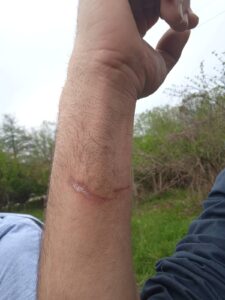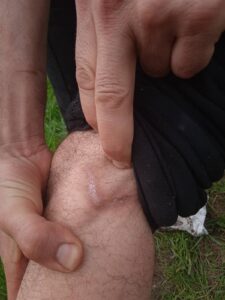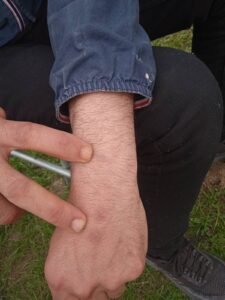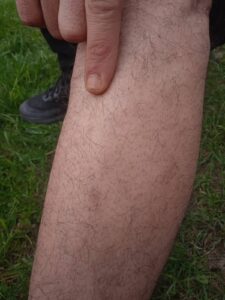Policeman points a weapon at his head and says "you do not move"
| 28.04.2023 | near road 55, Hungary | Collective Aid | 46.1775401, 19.5734447 | Hungary | Serbia | no | no | yes | no | no | no | no | 46 - 46 | 1 | Algeria | 13 | beating (with batons/hands/other), threatening with guns, dog attacks, destruction of personal belongings |
The respondent was a 46-year-old man from Algeria, traveling alone. He did not travel in a group and was not taken to a police station.
After 4 hours of walking (unpaved roads followed by forest), the respondent was apprehended at the Serbian-Hungarian border, more specifically at road 55 around 4 am by about 13 people (men and women) recognized by the respondent as police officers.
The respondent describes one of the officers taking his rifle/pistol and pointing it at his head saying to him: "You do not move", while another officer arrived with a dog. The respondent reported that the dog bit him in several places on his body, including his arm, hand, leg, and foot joint, as seen in the photographs. He then proceeded to defend himself, describing that one of the officers hit him and said to him "Let the dog, he does what he wants". As the reminder for prayer rang on the respondent's phone, two officers took the phone away and broke it. After this, the officers made the respondent get on a bus and pushed him back to Serbia, around the Subotica area. The respondent describes the police officers taking his ID away and a picture of his face. They did not, however, take his fingerprints. The respondent didn't sign any documents, nor did he pay any removal fees. Police officers disinfected the dog bites at the place of apprehension and again in the camp in Subotica.
The first policeman points his rifle/pistol at the head of the person who testifies and says to him "you do not move". The second policeman arrives with the dog. The third policeman gets behind the person who testifies, the person who testifies does not know what he did behind him. Then, the third arrives with the dog (Malinois). The dog bites the person who testifies in several places of the body (see photos). He then defends himself, a police officer hits him and says to him "let the dog, he does what he wants". The reminder of prayer (Muslim) installed on the telephone of the person questioned rings. A police officer is surprised. The person who testifies explains that it is a prayer reminder. A "nice policeman" confirms (a police officer who has already stopped the interviewee twice at the Hungarian border). The police officer who was surprised took the phone and broke it.
The police made him return to Serbia in a bus, but no detention. The police took his ID off him and a photo of his face, but no fingerprints taken. No signatures on documents. No removal fees. No application for asylum. Police officers disinfected the dog bites at the place of arrest and again in the camp of Subotica.




